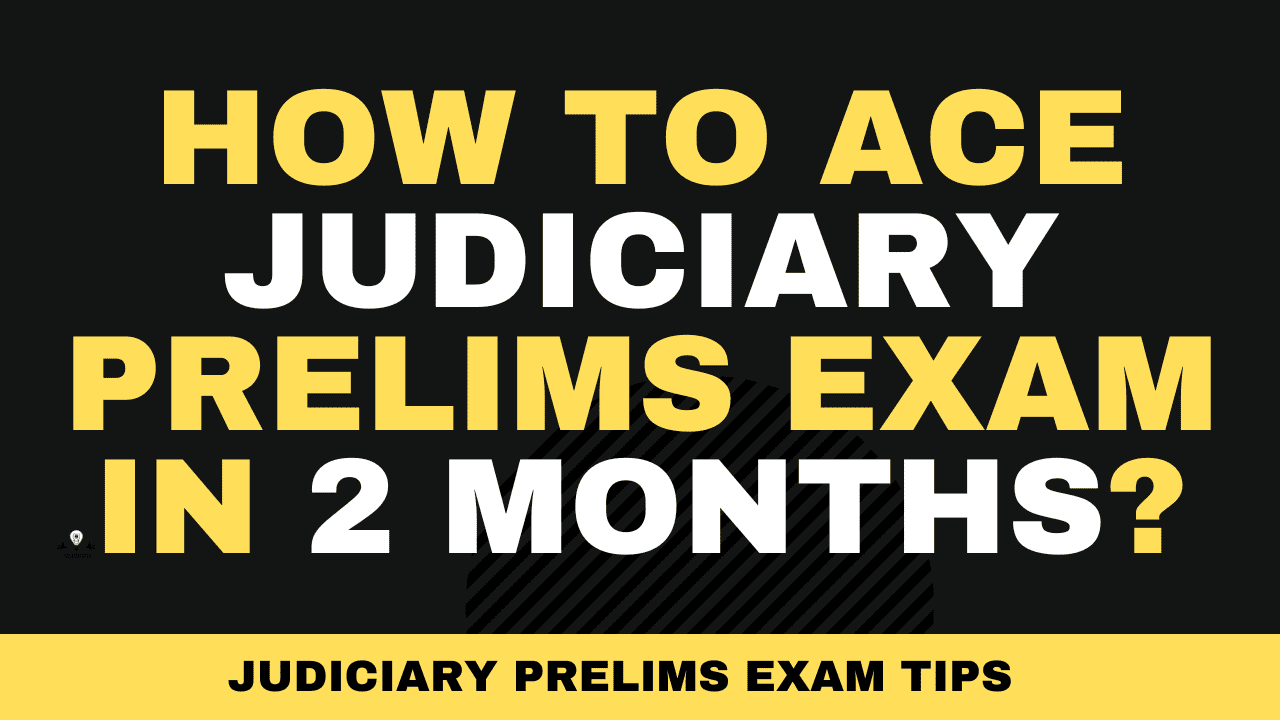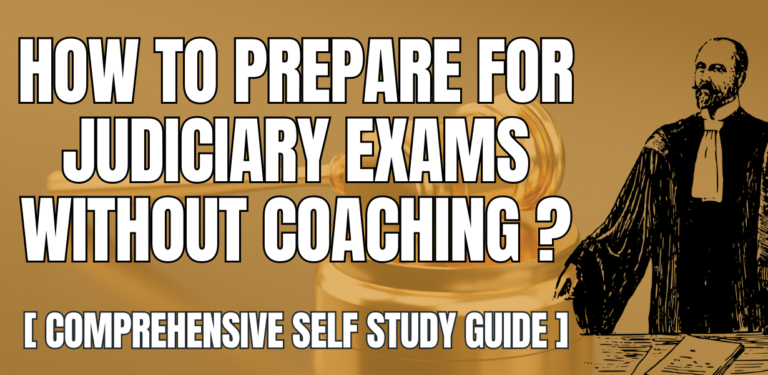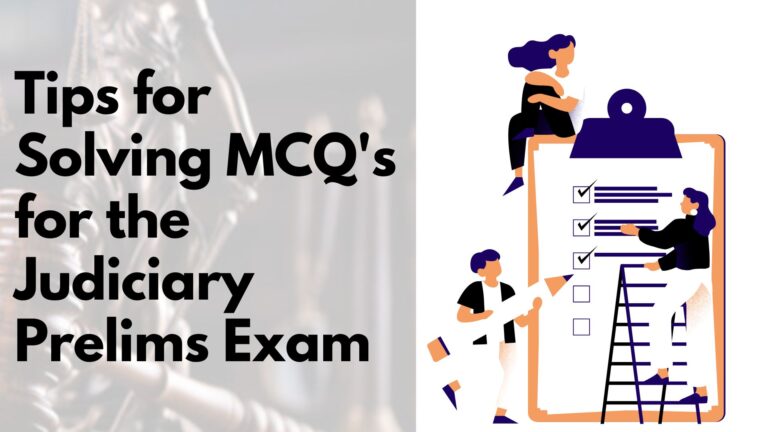How to Ace Judiciary Prelims Exam in 2 Months?

Preparing for the Judiciary Prelims Exam can be a difficult task especially if you only have two months to prepare. However, with the right preparation tips and plans, you can maximize your chances of success.
As a Judiciary aspirant, it is important to understand the format of the exam, the topics covered, and the level of difficulty which varies from State to State.
This post will provide you with a in-depth guide on how to prepare for the Judiciary Prelims Exam in just two months.

The Judiciary Prelims Exam is a highly competitive exam that tests your knowledge of various legal subjects and current affairs. To prepare for this exam, you need to have a solid understanding of the syllabus and the exam pattern.
A very important thing to note here is; the syllabus and strategy for the exam varies from one state to another as there are different subjects and the pattern is also different for few states.
You should also be familiar with the types of questions that are asked in the exam. This will help you to focus your preparation and ensure that you are well-prepared for the exam.
As a Judiciary aspirant, you need to develop a preparation strategy that works for you. This may involve creating a study schedule, taking mock tests, practicing previous year question papers, and seeking guidance from experts.
By following a structured approach to your preparation, you can ensure that you cover all the important topics and maximize your chances of success in the Judiciary Prelims Exam.
Understanding the Structure

To prepare for the Judiciary Prelims Exam, it is essential to understand the exam’s structure. The Judiciary Exam is conducted by the Public Service Commission to recruit judges for the subordinate courts. The exam is divided into three stages – Preliminary Exam, Mains Examination, and Interview.
Preliminary Exam
The Preliminary Exam is the first stage of the Judiciary Exam and is conducted to test the candidate’s basic knowledge of the law and Current affairs.
When I talk about Current affairs, it includes legal current also. So you need to be well versed with the legal topics also.
The exam consists of objective type questions and is divided into two parts – General Knowledge and Law. The General Knowledge section includes questions from legal current, current affairs, history, geography, and other general topics.
Mains Examination
The candidates who qualify for the Preliminary Exam are eligible to appear for the Mains Examination. The Mains Exam is a written exam and is conducted to test the candidate’s knowledge of the law in detail.
Interview
The candidates who qualify for the Mains Exam are eligible to appear for the Interview. The Interview is the final stage of the Judiciary Exam and is conducted to test the candidate’s personality, communication skills, and knowledge of the law.
Is it possible to prepare for Judicial Services in 2 Months?

Preparing for the Judiciary Prelims Exam in just two months might seem like a daunting task, but it is definitely possible with the right approach. The key is to have a clear strategy and to make the most of the time available.
To prepare for the exam in two months, you need to have a well-structured plan. This plan should include a detailed syllabus, study materials, and a timetable.
You should divide the syllabus into topics and allocate time for each topic. Make sure that you cover all the topics in the syllabus.
It is also important to practice previous year question papers and mock tests. This will help you understand the exam pattern and the type of questions asked. It will also help you identify your strengths and weaknesses.
With a clear strategy, a well-structured plan, and consistent effort, you can crack the exam and achieve your goal of becoming a Judicial Services Officer.
Key Subjects and Topics

To prepare for the Judiciary Prelims Exam in two months, you need to focus on the key subjects and topics that cover the majority of the exam. Here are the subjects and topics that you should prioritize:
1. Indian Polity and Constitution
This subject covers a significant portion of the Judiciary Prelims Exam. You should focus on topics such as the Fundamental Rights, Directive Principles of State Policy, and the powers and functions of the executive, legislature, and judiciary.
2. Indian Penal Code
Indian Penal Code is one of the most important subjects in the Judiciary Prelims Exam. You should study the various sections of the IPC, such as General Exceptions, Offences against the property and Offences against the Human Body.
3. Indian Evidence Act
The Indian Evidence Act is another important subject that you need to study thoroughly. You should focus on topics such as the types of evidence, admissibility of evidence, burden of proof, and relevancy of evidence.
4. Code of Criminal Procedure
The Code of Criminal Procedure is a vital subject for the Judiciary Prelims Exam. You should study the various sections of the CrPC, such as the powers of the police, arrest and detention, bail, and trial procedures.
5. Code of Civil Procedure
The Code of Civil Procedure is also an essential subject that you need to study. You should focus on topics such as the jurisdiction of courts, the principles of natural justice, pleadings, and the execution of decrees.
Make sure you cover all the important concepts and practice as many questions as possible to improve your chances of success.
Crafting a Study Plan
Here are some strategies to help you create an effective study plan to prepare for the Judiciary Prelims Exam in just 2 months.
Time Management Strategies
Time management is crucial when it comes to preparing for an exam in a short period. You need to allocate enough time to each subject while ensuring that you have enough time for revision. To manage your time effectively, consider the following strategies:
- Create a daily schedule: Allocate time for each subject and stick to it.
- Take short breaks: Taking short breaks can help you stay focused and avoid burnout.
- Prioritize difficult topics: Start with the difficult topics and allocate more time to them.
- Avoid distractions: Eliminate any distractions that may hinder your concentration.
Prioritize Topics
It is essential to prioritize the topics that are likely to appear in the exam. Here are some tips to help you prioritize:
- Analyze previous years’ question papers: This will help you identify the most important topics.
- Focus on the basics: Ensure that you have a good understanding of the fundamentals before moving to advanced topics.
- Allocate more time to important topics: Allocate more time to topics that are more likely to appear in the exam.
Selecting the Right Study Material
Selecting the right study material is crucial for effective preparation. Here are some tips to help you select the right study material:
- Stick to the syllabus: Ensure that the study material covers the entire syllabus.
- Choose reliable sources: Choose study material from reliable sources to avoid misinformation.
- Avoid overloading yourself: Do not overload yourself with too much study material. Stick to a few reliable sources.
By following these strategies, you can create an effective study plan and prepare for the Judiciary Prelims Exam in just 2 months. Remember to stay focused, manage your time efficiently, and prioritize the topics that are likely to appear in the exam.
Enhancing Legal Knowledge
To crack the Judiciary Prelims Exam in two months, you need to have a strong legal knowledge base. Here are some tips to enhance your legal knowledge:
Staying Updated with Current Affairs
Current affairs play a crucial role in the Judiciary Prelims Exam. You should be aware of the latest legal developments, landmark judgments, and case laws. To stay updated, you can follow legal news websites, read newspapers, and watch news channels.
Make a habit of taking notes of the important news and events related to the legal field. You can also create a table of contents with headings like the name of the case, date, court, and brief facts of the case. This will help you to revise and remember important cases.
Also Check: How to Fetch More Marks in Judiciary Mains Exam?
Understanding Case Laws and Judgments
To excel in the Judiciary Prelims Exam, you must have a good understanding of case laws and judgments. You should read the judgments of the Supreme Court and High Courts, and analyze the reasoning behind the judgments.
Make a list of important cases and read them thoroughly. You can also create a mind map or flowchart to understand the hierarchy of the courts and the appellate jurisdiction of each court.
To conclude, enhancing your legal knowledge is essential to crack the Judiciary Prelims Exam. Stay updated with current affairs and understand case laws and judgments to increase your chances of success.
Revision Techniques

When it comes to preparing for the Judiciary Prelims Exam in just two months, revision is the key. Here are some effective revision techniques to help you optimize your study time.
Utilizing Charts and Diagrams
Charts and diagrams can be a great way to simplify complex legal concepts and make them easier to understand and remember. Try creating visual aids for important topics such as the Indian Constitution, Indian Penal Code, and the Code of Criminal Procedure.
Use different colors and fonts to highlight key points, and make sure to include plenty of white space to avoid clutter.
Regular Review Sessions
Regular review sessions can help you retain information and identify areas where you need more practice. Do review the material you have covered so far, and make note of any topics that you are still struggling with. You can also use this time to create flashcards or practice quizzes to help reinforce your knowledge.
By utilizing these revision techniques, you can improve your chances of success on the Judiciary Prelims Exam. Remember to stay focused, stay organized, and stay committed to your study plan. Good luck!
Staying Motivated and Confident

Preparing for the Judiciary Prelims Exam, with the right mindset and strategies, you can stay on track and increase your chances of success.
Managing Stress and Distractions
Stress and distractions are common obstacles that can hinder your progress. To manage stress, take regular breaks and engage in activities that help you relax, such as meditation, yoga, or exercise. It’s also important to avoid multitasking and focus on one task at a time to minimize distractions.
Learning from Toppers’ Experiences
Learning from the experiences of previous toppers can be a great way to stay motivated and gain valuable insights. By understanding their strategies, you can identify your strengths and weaknesses and tailor your preparation accordingly.
Remember that staying motivated and confident is the key to achieving your goals. With a positive attitude and effective strategies, you can overcome any obstacle and succeed in the Judiciary Exam.
Don’t Worry about Interview Round
If you are preparing for the Judiciary Prelims Exam, you might be worried about the interview round. However, it is important to remember that the interview is just one part of the selection process. You can prepare for it just like you would for any other part of the exam.
Developing Communication Skills
One of the most important things you can do to prepare for the interview is to develop your communication skills. This includes both verbal and non-verbal communication. Here are some tips to help you improve your communication skills:
- Practice speaking clearly and confidently.
- Use appropriate body language, such as maintaining eye contact and sitting up straight.
- Listen actively to the interviewer and respond thoughtfully.
- Avoid using filler words such as “um” or “like”.
- Be aware of your tone of voice and try to convey enthusiasm and interest.
In addition to practicing your communication skills, you can also benefit from mock interviews. These can help you become more comfortable with the interview process and identify areas where you need to improve.
Also Check: Tips for Solving MCQ’s for the Judiciary Prelims Exam






